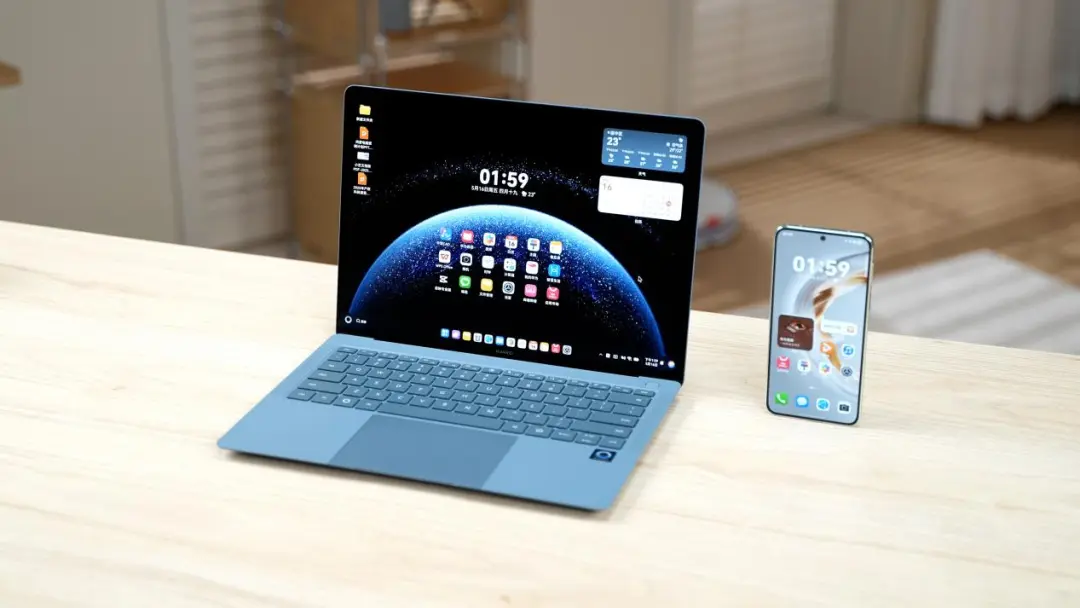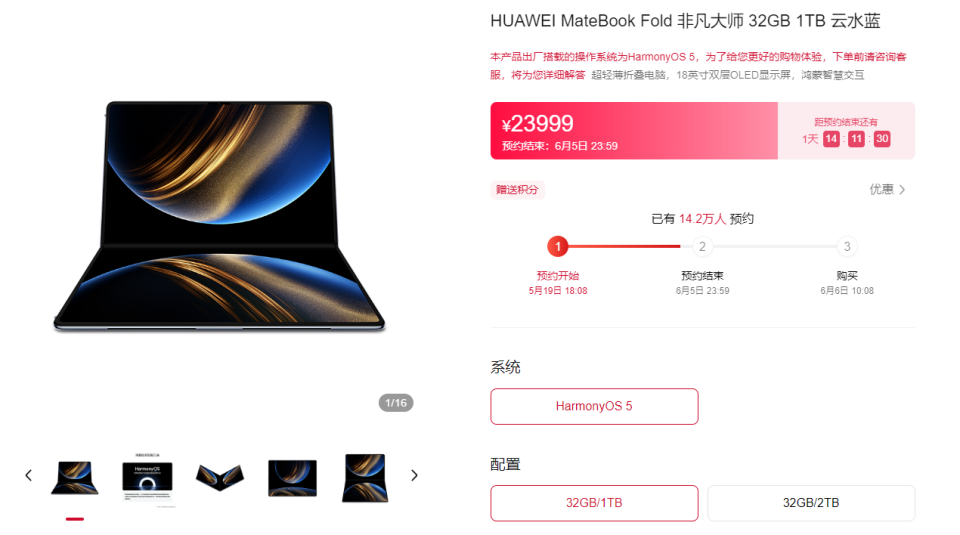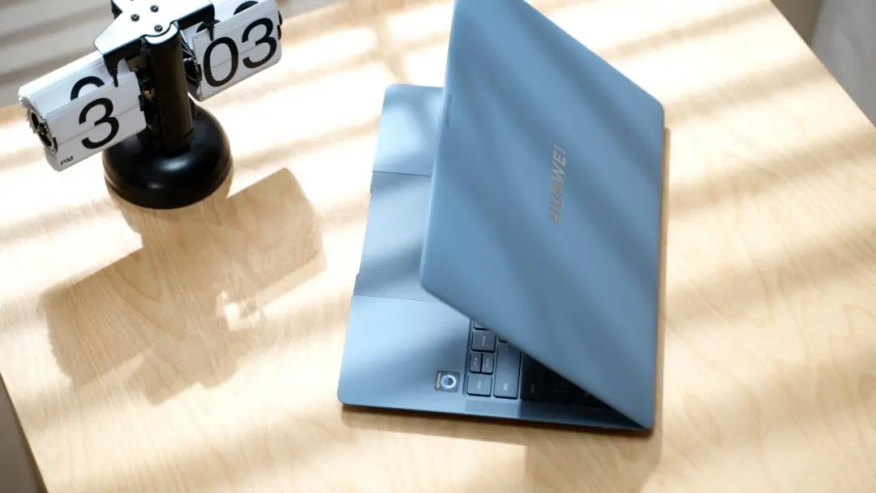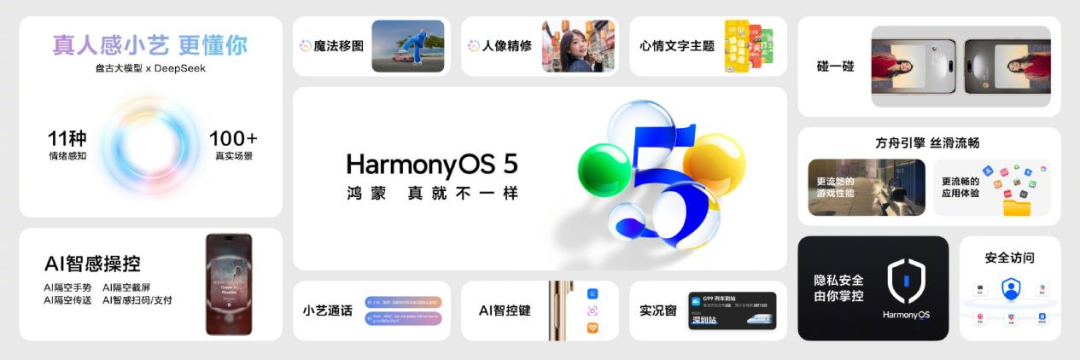Huawei Embarks on the Competitive Landscape of HarmonyOS Laptops
![]() 06/06 2025
06/06 2025
![]() 571
571

The battle ahead promises to be a long one.
Written by / Chen Dengxin
Edited by / Li Ji
Typeset by / Annalee
Pre-orders for HarmonyOS laptops are drawing to a close.
Huawei's MateBook Pro and MateBook Fold (Master Edition), equipped with the "pure" HarmonyOS, garnered approximately 100,000 pre-orders within 24 hours.
Subsequently, the growth in pre-orders slowed, with daily increments dropping to four digits.
As of June 4, 2025, the cumulative number of pre-orders for both products stands at approximately 197,800, with no doubt that the final tally will hover around 200,000.
Despite this, online skepticism persists, with various criticisms levied against the MateBook Pro and MateBook Fold (Master Edition).
Admittedly, Microsoft has dominated the computer system landscape for years, making it a formidable challenge for HarmonyOS to break through. However, this battle must be confronted head-on.
Market views are sharply divided.
Regarding HarmonyOS's entry into the computer system arena, there is significant dissent from external stakeholders.
One camp believes that the task is arduous and the journey long.
In 2025, coinciding with the 40th anniversary of the Windows operating system, Microsoft's continuous operation has ingrained the notion of "Windows=system, system=Windows" in the public's mind.
Reshaping consumer perceptions is not something that can be achieved overnight.
According to StatCounter data, in April 2025, the Windows operating system held a market share of 71.06%, macOS had 15.64%, and Linux accounted for 4.27%.
Microsoft's dominance is evident.
Against this backdrop, some netizens hold a pessimistic view of HarmonyOS's foray into the computer market, believing that its success in the mobile phone market may not translate to the computer market.
"As long as Microsoft doesn't go bankrupt, it will always be the number one in the computer industry!"
"What advantage does HarmonyOS have over Windows, and what problems does it solve that exist in Windows?"
"You can play within the rules set by others, but they can redefine the rules, while you can't..."

MateBook Fold Master Edition pre-orders exceed 140,000
Another camp believes that the world has suffered from Microsoft's monopoly for too long.
Due to the lack of strong competition, Microsoft has achieved a "default win" in the computer operating system race, resulting in Windows iterations that are difficult to praise.
An internet observer told Xin Kedu: "The iteration path of Windows has been bumpy, often characterized by 'one generation strong, one generation weak.' XP was a classic, while Vista was a disappointment. Windows 7 turned the tide, but Windows 8 failed miserably. Windows 10 was highly capable, while Windows 11 is difficult to commend."
Worse still, Windows seems to be lost in the AI era.
The Windows 11 version of the Copilot application has undergone multiple iterations but still faces issues, failing to captivate users and becoming the butt of public jokes. "Microsoft's AI seems to be getting worse with each use. When it first launched, the experience was almost on par with GPT."
As a result, Windows 11, powered by AI, has a significantly smaller market share than Windows 10.
Coincidentally, AI is HarmonyOS's strength.
"SmartCat" said: "When you input 'Help me generate a PPT for HarmonyOS laptop launch marketing plan' in Xiaoyi, it automatically calls the installed WPS AI function to generate a usable PPT. In the current environment with numerous and varied AI office software, HarmonyOS's trick of 'AI managing AI' saves us the hassle of switching between different products, precisely invoking AI to further enhance office efficiency."
It is evident that HarmonyOS stands a chance of success.
"SmartCat" further pointed out that the default layout of HarmonyOS laptops is more akin to Mac, but to accommodate Windows users' habits, similar interfaces are also available in the settings. The start menu familiar to Windows users has been transformed into a circular button in the lower left corner, and clicking on it still presents familiar operations.
In other words, HarmonyOS caters to Windows users' usage habits.
It should be noted that due to its self-developed approach, HarmonyOS differs significantly in terms of databases, programming languages, development environments, security architectures, etc., enabling it to play the "security card".

Image source: SmartCat
Currently, the situation of network security remains severe.
Entering the AI era, ordinary individuals can easily become "hackers" with the aid of large models, even without coding or hacking skills.
Well-known internet technology blogger RevengeRangers said: "There are actually people using ChatGPT to write trojans, which have been widely implanted and analyzed by security vendors."
In this way, HarmonyOS can meet high security requirements.
"Feixiang Wang Xiangligang" said: "The primary function of today's computers is for office work, which demands smoothness, stability, security, and portability, especially security. HarmonyOS computers are less susceptible to viruses, and for users, the enhanced experience brought by security and smoothness is apparent."
Data from RiskIQ, a cybersecurity company under Microsoft, reveals that cybersecurity issues cause businesses worldwide to lose $1.8 million per minute, amounting to nearly $1 trillion annually.
In summary, HarmonyOS has its own strengths to leverage.
Improving the ecosystem remains a work in progress.
It is uncertain how far HarmonyOS laptops can go. The only certainty is that HarmonyOS has finally formed a closed loop.
That is, all Huawei terminals, including smartphones, tablets, and laptops, utilize the same system, "achieving unified devices and systems for the first time, with ecological data flowing with people, and a more consistent user experience across devices".
In layman's terms, HarmonyOS has completed the final piece of the ecological puzzle.
An industry insider told Xin Kedu: "There is no need to dwell on the price and sales volume of HarmonyOS laptops. The real significance lies in the enhancement of the HarmonyOS ecosystem, providing the industry with a Plan B. If it encounters a 'choking point' in the future, the industry still has an alternative path."
The aforementioned industry insider further stated that while there were previously Plan Bs such as UOS and Kylin OS, they were all based on the Linux kernel and not fully self-developed, resulting in deficiencies in user experience, application ecology, etc. HarmonyOS's cross-device capability can compensate for these shortcomings and offer more options for the information technology and innovation market.
As of the first quarter of 2025, the total number of HarmonyOS devices has surpassed 1 billion, outpacing the iOS system in domestic market share and ranking second in the industry.
With a complete ecological puzzle, HarmonyOS also possesses greater potential energy.
For instance, in recent years, the industry has been keen on supporting independent games. Some remain at the verbal level, while others open access but fail to follow through. HarmonyOS not only considers traffic support but also provides a one-stop service for development, migration, launch, promotion, and feedback.
"Game Grape" said: "For HarmonyOS, it needs these distinctive works to enrich its content ecosystem; for developers, they also need a new platform with less competition to gain attention. On other platforms, independent games rely on luck to be noticed, but on HarmonyOS, it is more of a planned collaboration. As long as the product itself has unique features and is willing to put in effort to adapt, it can generally obtain a certain degree of exposure and conversion. Such opportunities are rare for many independent developers."
Taking "A Perfect Day" as an example, the download data within a week after its launch on HarmonyOS exceeded that of multiple mainstream game download platforms, including iOS.

HarmonyOS promotes the independent game "A Perfect Day"
This underscores HarmonyOS's commitment to supporting independent games.
Sun Yingdong, head of Huawei's game operation center, said: "We hope that with Huawei's full support and policy empowerment, in the near future, we can jointly incubate several unique, future-oriented, inherently cross-device, and full-scenario new-form games with independent game developers for the HarmonyOS ecosystem."
Another example is that mobile phone manufacturers are embracing generative AI, optimizing hardware performance, and integrating it into mobile phone systems. Consequently, AI mobile phones are prevalent, capable of competing with internet AI applications.
The "2025 Global AI Application Market Report" shows that as of March 2025, among the top 15 native apps in terms of active user scale, all six major mobile phone manufacturers are on the list; among them, Huawei Xiaoyi has a monthly active user scale of 157 million, second only to DeepSeek.
It is evident that HarmonyOS has become a crucial driver for the implementation of AI applications.
Nevertheless, HarmonyOS still faces challenges that cannot be ignored, and there is still work to be done to go further and longer.
Firstly, the number of applications is far from sufficient.
"HarmonyOS Creation - The Dawn of the Terminal Operating System" points out: "100,000 applications are a sign of maturity for the HarmonyOS ecosystem to meet consumer demand, and this is HarmonyOS's key goal for 2025."
However, at the beginning of 2025, the number of HarmonyOS applications was only 20,000, leaving a considerable gap to fill.
Secondly, some well-known overseas applications are absent.
Due to various reasons, domestic top and mid-tier applications have adapted to HarmonyOS, but this is not the case for foreign applications. This was originally not a significant issue on mobile devices but cannot be overlooked on computer devices.
Fortunately, there are alternatives.
WPS can replace Office, Zhongwang CAD can replace AutoCAD, Meitu can replace Photoshop, HaoYa can replace WinRAR...

Image source: Huawei Terminal Weibo
Thirdly, it takes time to refine.
A market observer told Xin Kedu: "When the pure HarmonyOS was first launched, its reputation was not very good. Some developers wanted to wait until the system was more mature before making plans to save time on debugging."
Public information shows that from October 2024 to March 2025, pure HarmonyOS collected over 4 million pieces of user feedback, driving the system to complete more than 30 iterations.
Such a vast amount of user feedback indirectly indicates that HarmonyOS still needs some time to mature.
In essence, HarmonyOS has completed the cross-device layout of the operating system and will compete with Microsoft, Apple, and Google in the future. This necessitates HarmonyOS to bolster its internal capabilities and address its shortcomings as soon as possible.
Then, this will indeed be a protracted battle.






